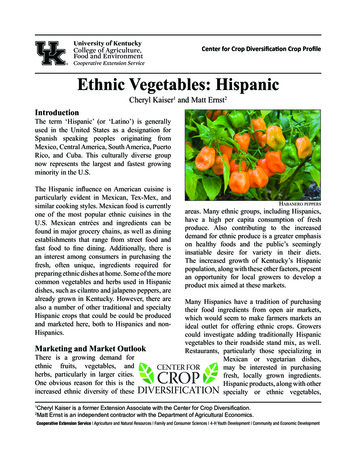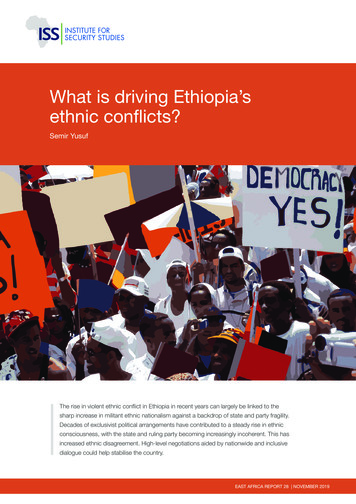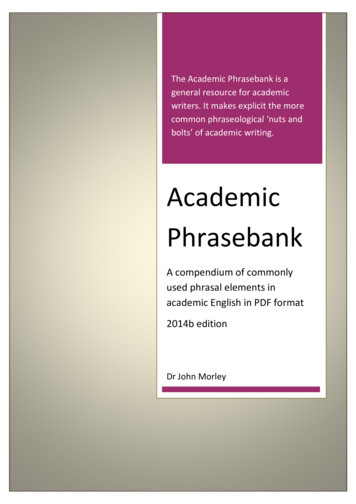Democracy, Ethnic Benjamin Reilly Fragmentation, And .
Democracy, EthnicFragmentation,andBenjaminReillyInternal ConflictConfused Theories,Faulty Data, and the"Crucial Case" of Papua New GuineaITwo countervailingthemes have dominated world politics over the past decade: the continuingspread of democraticgovernmentand the explosion of intercommunalethnicviolence around the globe. In many cases, risinglevels of internalconflict,particularlyethnicconflict,have accompanied transitionsfromauthoritarianruleto democracy.'The collapse of authoritarianregimesin EasternEurope, LatinAmerica,Africa,and Asia has resultedin a threefoldincreasein the numberofdemocraticregimesaround theworld.2Despite recentbackslidingin a numberof regions,major transitionsto democracycontinueto occur in pivotal statessuch as Indonesia, Nigeria,and Russia. At the same time,however,the worldhas witnessed a change in the natureof armed conflict,toward intrastateviolence and ethnicconflict.Most violentconflictstoday occur not between statesbut withinthem:Of the 110 majorarmed conflictsbetween 1989 and 1999,only7 were traditionalinterstateconflicts.The remaining103 took place withinexBenjaminReillyis a ResearchFellowat theAuistralianNationalUniversity.His mostrecentbookis Democracy in Divided Societies: Electoral Engineeringfor ConflictManagement . See Renee de Nevers, "Democratization and Ethnic Conflict,"in Michael Brown, ed., EthnicConflictand ersityPress, 1993).2. This process has naturallyencouraged a considerableliteraturedealing withdemocratictransitionsand theirconsequences,and therelationshipbetweeninstitutionalchoices and theconsolidation of democracy.See, forexample, Guillermo O'Donnell and Philippe onsaboutUncertainDemocracies(Baltimore,Md.: JohnsHopkins UniversityPress,1986); LarryDiamond, JuanLinz, and SeymourMartinLipset,eds., Democracyin DevelopingCountries:Africa(Boulder,Colo.: Lynne Rienner,1988); Diamond, Linz, and Lipset, eds.,Democracyin DevelopingCountries:Asia (Boulder,Colo.: LynneRienner,1989); Diamond, Linz, andLipset,eds., Democracyin DevelopingCountries:LatinAmerica(Boulder,Colo.: LynneRienner,1989);Samuel P. Huntington,TheThirdWave:Democratizationin theLateTwentiethCentury(Norman: Universityof Oklahoma Press, 1991); Larry Diamond, Juan Linz, and Seymour Martin Lipset, eds.,Politics in racy,rev. ed. (Boulder, Colo.:LynneRienner,1995); LarryDiamond and Mark F. Plattner,eds., TheGlobalResurgenceofDemocracy(Baltimore,Md.: JohnsHopkins UniversityPress, 1996); JuanLinz and AlfredStepan, ProblemsofDemocraticTransitionand Consolidation:SouthernEurope,SouthAmerica,and Post-CommunistEulrope(Baltimore,Md.: JohnsHopkins UniversityPress, 1996); and LarryDiamond, ,Md.: JohnsHopkins UniversityPress, 1998).IniternatioinalSecuirity,Vol. 25, No. 3 (Winter2000/01), pp. 162-185? 2000 by the Presidentand Fellows of Harvard College and the Massachusetts Instituteof Technology.162This content downloaded from 134.115.2.117 on Wed, 08 Jul 2015 06:14:40 UTCAll use subject to JSTOR Terms and Conditions
Democracyand InternalConflict 163istingstates,mostlyfocused around ethnicissues.3Between them,these parallel processes of democratization and ethnic conflict have defined theinternationalagenda in the post-Cold War period. They have also refocusedboth scholarlyand policy attentionon the relationshipbetween democraticpolitics,ethnicgroup demography,and internalconflict.4scholarlyattentionis the effectofOne issue thathas not received sufficientdifferenttypesof ethnicdivision on political stabilityand democraticperformance. Like Tolstoy'sunhappy families,ethnicallydivided societiestend to bedivided in differentways. For example, divided societies can be fragmentedinto many contendinggroups (e.g., Papua New Guinea and Tanzania) or balanced betweena few similarlysized ones, whichcan thenbe brokendown intoTheybipolar (e.g., Fiji and Cyprus) or multipolar(e.g., Bosnia) configurations.can featuredominantmajorities(e.g., Sri Lanka) or dominantminorities(e.g.,Rwanda). Minoritiescan be based on indigenous or otherhomeland societies,or on settlerdiasporas (e.g., Russians in the Baltics). Ethnicgroups can be divided by internationalboundaries between several states (e.g., Kurds) or enconcentratedtirelyencapsulated by a single state. Groups can be territoriallyor widely dispersed.The natureof theethnicdivide can thushave a significantinfluenceon the way ethnicconflictsare manifestedand consequentlyon thecapacity of the political systemto manage them.As is discussed below, many scholars and policymakersappear to believethat increasing ethnic diversityundermines a state's democratic prospects.This articlechallenges thatpresumption.It looks at the relationshipbetweenethnicfragmentationand democracyfromtwo perspectives.At a comparativelevel, it examines the adequacy of the data collectionsused by a number oflarge-N comparativestudies on this issue, and on the theoriesderived fromthem. At a case-study level, it analyzes the reasons behind the apparentlyanomalous democratichistoryof theSouth Pacificstateof Papua New Guinea,which on many indicatorsis the most ethnicallyfragmentedsociety in theworld. Taken together,these macro-and micro-levelperspectivesraise seriousquestions about the adequacy of existingtheorieson the relationshipbetweenIn particular,theysuggest thatdemocraticpolitics and ethnicfragmentation.the conventionalwisdom-that ethnicfragmentationnecessarilyundermines3. Peter Wallensteenand Margareta Sollenberg,"Armed Conflict,1989-99," JournalofPeace Research,Vol. 37, No. 5 (September2000).4. For a policy-focusedapproach to these issues, see PeterHarris and Ben Reilly,eds., racyand Deep-RootedConflict:OptionsforNegotiatorsand ElectoralAssistance,1998).This content downloaded from 134.115.2.117 on Wed, 08 Jul 2015 06:14:40 UTCAll use subject to JSTOR Terms and Conditions
InternationalSecurity25:3 164prospectsfordemocracy-is wrong,and thatunder some circum-stances,thepresenceof manyethnicgroups can actuallybe a positivefactorfordemocraticstabilityand persistence.WhatWe KnowScholars have traditionallybelieved that internalethnic divisions are detrimental to democraticstability.A classic example is the case against the likelihood of democracy in divided societies put forthby Alvin Rabushka andKennethShepsle, who argue thatwould-be politicalleaders typicallyfindtherewards of "outbidding" on ethnic issues-moving toward increasinglyextremistrhetoricand policy positions-greater thanthoseof moderation.5Democraticprospectsare underminedby the strongtendencytoward politicizationof ethnicdemands, which in turnoftenleads to zero-sum,winner-take-allpolitics in which some groups are permanentlyincluded and some permanentlyexcluded. Because ethnicidentitiestend to be highlysalient in divided societies, unscrupulous would-be ethnicleaders-"ethnic entrepreneurs"-have astrongincentiveto harness these identitiesas a politicalforceand to use communal identityas the base instigatorof votermobilization.This oftenleads todivisivenessand conflictbecause the demands of one group generallycome atthe expense of others.Because demands based on outbiddingare ofteneasierto maintainthan those based on accommodation,politicsin divided societiescan quicklybecome characterizedby centrifugalpressures,in which the moderatepoliticalcenteris overwhelmedby extremistforces.The failureof democraticpoliticsis oftenthe result.Althoughfew scholarsargue thatethnicdivisions are a positive force,thereis debate about whetherdifferentdegrees of ethnicheterogeneitycan help orhinder democracy.The most common contentionis that increasinglevels ofethnicfragmentationmake democracymore difficult.Indeed argumentsforanegative relationshipbetween ethnic fragmentationand democracy have along and venerable lineage in political science. Some of the greatestpoliticalthinkershave argued that stable democracyis possible only in relativelyhomogeneous societies. JohnStuartMill, for example, thoughtthat democracywas incompatiblewith the structureof a multiethnicsociety,as "freeinstitunationalities."6tions are next to impossible in a countrymade up of differentInsta5. Alvin Rabushka and KennethA. Shepsle, Politicsin PluralSocieties:A TheoryofDemocraticbility(Columbus, Ohio: Merrill,1972).(New York: Liberal Arts Press,6. JohnStuart Mill, Considerationson RepresentativeGovernment1958[1861]),p. 230.This content downloaded from 134.115.2.117 on Wed, 08 Jul 2015 06:14:40 UTCAll use subject to JSTOR Terms and Conditions
Democracyand InternalConflict 165GabrielAlmond's seminal 1956 ted a relationshipbetween ethnicfractionalizationand risingconflict.7This was a prevalentview among many scholars and policymakersthroughthe 1960s, with the perils of tribalismand ethnicdivision frequentlycited astherootcauses of democracy'sfailurein themanynewlyindependentstatesofAfricaand Asia.8 Since then,a series of cross-nationalstudies on the effectofethnicheterogeneityon politicalstabilityhave concluded thatas thenumberofethnicgroups in a stateincreases,the prospectsforsustainabledemocracydecreases. One of the firstsuch studies, Robert Dahl's Polyarchy,utilizingdatacollected in the 1960s, concluded that although democracy in highly fragmented countrieswas not impossible, "pluralism often places a dangerousstrain on the toleranceand mutual securityrequired for a systemof publiccontestation,"and hence "a competitivepoliticalsystemis less likelyin countrieswitha considerablemeasure of subculturalpluralism."9Around the sametime, Rabushka and Shepsle found that one of the "strikingregularities"among ethnicallyfragmentedsocieties was that "democracy frequentlygivesway to formsof authoritarianrule."l0Arend Lijphartargued in his work onconsociationaldemocracy,Democracyin Plural Societies,thatthe optimal number of groups for peaceful ethnicconflictmanagementis threeor four,withconditionsbecomingprogressivelyless favorableas numbersincreasebecause"co-operationamong groups becomes more difficultas the numberparticipating in negotiationsincreases."11Probably the most sophisticated study to date of this issue remainsG. Bingham Powell's ContemporaryDemocracies,a cross-nationalmultivariateanalysis of factorsaffectingdemocraticprospectsutilizingdata fromtwentynine democracies. Powell found a positive relationship between ethnicfractionalizationand governmentinstability,with greaterlevels of instabilityHe also founda strongcorrelatedwithhigherlevels of ethnicfractionalization.positive relationshipbetween increasing fractionalizationand high rates ofdeath by violence.12Powell's studyis not theonly one to draw a directstatisti-7. lofPolitics,Vol. 18 (1956),pp. 391-409.8. See, for example, David A. Low, Eclipseof Empire(Cambridge: Cambridge UniversityPress,1991), pp. 272-273.and Opposition(New Haven, Conn.: Yale University9. Robert A. Dahl, Polyarchy:ParticipationPress, 1971), pp. 109, 111.10. Rabushka and Shepsle, Politicsin Plural Societies,pp. 177-178.11. Arend Lijphart,Democracyin Plural Societies:A ComparativeExploration(New Haven, Conn.:Yale UniversityPress, 1977), p. 56.and Violence(Cambridge,12. G. BinghamPowell, ss.: Harvard UniversityPress, 1982), pp. 44-46.This content downloaded from 134.115.2.117 on Wed, 08 Jul 2015 06:14:40 UTCAll use subject to JSTOR Terms and Conditions
InternationalSecurity25:3 166cal onalizationon the onehand and decreasingdemocraticprospectson the other.More recently,forexample, cross-nationalstudies by Jan-ErikLane and Svante Ersson (1990) andAxel Hadenius (1992) also found a negative correlationbetween ethnicdiversityand democraticpersistence."3In general,particularlyamong policymakersthereis stilla common presumptionthat"ethnichatreds"createdby communal cleavages are the chiefcause of ethnicconflict,making it "reasonable tosuppose that,ceterisparibus,the extentof intra-societalethnicand religiousha14tred is related to the extentof theirrespectivedegrees of fractionalization."This presumptionextendsacross the social sciences: "Both economistsand social scientistshave postulated that such fractionalizationis unambiguously15 A recentand prominentadvocate of thisorthodoxyhasconflict-enhancing."been the U.S. privatefoundationFreedom House, which publishes an annualrankingof democracyand freedomaround theworld. Its 1998-99 reportfoundthat"countrieswithouta predominantethnicmajorityare less successfulin establishingopen and democraticsocieties than ethnicallyhomogenous countries,"and thatmonoethniccountriesare twice as likelyto be ranked "free"asare multiethnicones.16By contrast,a few scholarsargue thatethnicfragmentationmay actuallyassist prospects for democracy in multiethnicstates. In cases where there aremany small and geographically concentratedgroups, for example, it maymake littlesense forthemto devote energyto political activitymuch beyondtheirlocality-meaning that,"fromthe standpointof ethnicconflict,much ofthe pressureis offthe center.""7Thus one explanationforthe democraticsuccess of India-a countrythaton many indicatorsis the most "deviant" of allthe establisheddemocracies-has in large partbeen the productof thatdiversityitself,"forat the nationallevel . no single ethnicgroup can dominate."1813. Jan-ErikLane and Svante Ersson,ComparativePoliticalEconomy(London: Pinter,1990), p. 138;and Axel Hadenius, Democracyand Development(Cambridge: Cambridge UniversityPress, 1992),pp. 116-117.14. Paul Collier,TheEconomicsofCivil War(Washington,D.C.: WorldBank Monograph,1998),p. 3.15. Paul Collier and Anke Hoeffler,"On Economic Causes of Civil War," OxfordEconomicPapers,Vol. 50, No. 4 (1998), p. 571.16. See Adrian Karatnycky,"The 1998 Freedom House Survey: The Decline of Illiberal Democracy,"JournalofDemocracy,Vol. 10,No. 1 (January1999),pp. 117-118;and FreedomHouse, Freedomin theWorld:TheAnnualSurveyofPoliticalRightsand CivilLiberties,1998-1999 (New York:FreedomHouse), pp. 9-10.17. Donald L. Horowitz, EthnicGroupsin Conflict(Berkeley:Universityof CaliforniaPress, 1985),p. 37.18. RobertL. Hardgrave,Jr.,"India: The Dilemmas of Diversity,"in LarryDiamond and Marc F.and Democracy(Baltimore,Md.: JohnsHopkins UniverPlattner,eds., Nationalism,EthnicConflict,sityPress, 1994), p. 72.This content downloaded from 134.115.2.117 on Wed, 08 Jul 2015 06:14:40 UTCAll use subject to JSTOR Terms and Conditions
Democracyand InternalConflict 167Other scholars have interpretedthe democraticsuccess of the Philippines asbeing facilitated"by ethniccompositionswhich make it difficultforany singleethnicgroup to predominate,"therebyencouragingthe formationof multiethnic alliances."9Similarly,some analysts see Indonesia's surprisinglysmoothongoing transitionfromauthoritarianrule as having been facilitatedby thecross-regionaland cross-ethniccharacterof the main political parties,makingthe quest forpower at the centera matterof cross-ethnicbargainingand shifting multiethniccoalitionsratherthan a zero-sumcontestbetween monoethnicpartyblocs.20In the same manneras those who contendthatethnicfragmentation and democracy are negativelyrelated, these scholars can also point tolarge-Nconfirmingstudies,such as a recentregressionanalysis thatfound "little sign of any particularlydetrimentaleffectsof ethnicand religiousfragmentationon state stabilityand performance."'21Both of these argumentscannotbe right-thereis eithera negativerelationship between ethnicfragmentationand democraticprospects,or thereis not.In the followingpages I examine thisissue froma micro-and macro-levelperspective.At the microlevel, I look at the surprisingdemocraticsuccess to dateof the world's most ethnolinguisticallyfragmentedcountry-Papua NewGuinea (PNG). PNG combinestwo unusual featuresthatshould make it a caseof special interestto studentsof comparativepolitics.First,it boasts one of thedeveloping world's most impressive records of democratic longevity,withmore than thirtyyears of continuousdemocraticelections,all characterizedbyhigh levels of participationand candidature,and numerous peaceful changesof government.This factoralone is enough to put it into a relativelyrare categoryof developing countriesthatcan also be classifiedas "establisheddemocracies." Even more striking,however, is that PNG has combined this withand tribalviolence. Ethextremelyhighlevels of ethnolinguisticfragmentationnic conflictin PNG is predominantlya local-levelphenomenonand, althoughlocal conflictscan eventuallyrise to challenge the state itself(as has occurredover thepast yearin PNG's near neighbor,theSolomon Islands), thishas neverbeen a serious threatin PNG. As such, the PNG case functionsas what HarryEcksteincalled a "crucial case study" fortheoriesthatpostulate a causal link19. Harold Crouch, "Democratic Prospectsin Indonesia," Asian JournalofPoliticalScience,Vol. 1,No. 2 (1993), p. 83.20. The presenceofbroad, aggregative,and multiethnicpoliticalpartiesappears to be a crucialfacilitatingconditionfordemocracyin manydivided societies.See BenjaminReilly,Democracyin Divided Societies:ElectoralEngineeringfor ConflictManagement(Cambridge: Cambridge UniversityPress, forthcoming).21. Jan-ErikLane and Svante Ersson, ComparativePolitics:An Introductionand a New Approach(Cambridge: PolityPress, 1994), p. 204.This content downloaded from 134.115.2.117 on Wed, 08 Jul 2015 06:14:40 UTCAll use subject to JSTOR Terms and Conditions
InternationalSecurity25:3 168and democraticperformance-in otherwords,abetweenethnicfragmentationcase study that provides the key test of a theory'svalidity,and sometimesamore rigorous assessment than even a large-N comparative study.22I arguethat the primaryreason for PNG's democraticsuccess is the sheer diversityof its ethnicstructure,which virtuallyguaranteesthatno one group is able tosingle-handedlymonopolize politicalpower. My analysis suggeststhatundersome circumstances,ethnicfragmentationmay actually help consolidate demay be the overridingmocracyand thatPNG's extremeethnicfragmentationfactorin its democraticsuccess to date. Indeed, ratherthan hinderingdemocracy,PNG's ethnicdiversitymay actuallymake democracypossiblein an otherwise unpromisingsocioeconomic situation.At the macro level, I also look at the adequacy of the data collectionson thisissue used by a numberof thelarge-Ncomparativestudies cited above, particas the basisularly those thatutilize a numericindex of ethnicfragmentationfor theiranalyses. My findingssuggest some modificationsto the acceptedwisdom that ethnicfractionalizationis negativelyrelated to democraticlongevity.In particular,I findthatthe ongoing linkagebetween ethnicfragmentation and stateor democraticfailureposited in much of the academic literatureby a sucmay have its rootsin thefaultymeasurementof ethnicfragmentationcession of comparativestudies thathave relied upon one source: a Russian anthropologytextof the early 1960s,AtlasNarodovMira (The atlas of the peoplesof the world). This was used as a data source by Charles Taylorand MichaelHudson in their WorldHandbookofPoliticaland Social Indicators,published in1972 and subsequentlyin differenteditions until 1983.23This index has beenused as the basis for measuring ethnic fragmentationby many subsequentstudies. As I discuss in the conclusionto thisarticle,however,thereare seriousquestions about the scope and reliabilityof the NarodovMira data set. It isthereforeworth reconsideringwhether the conclusions of the comparativestudies based on the Taylor and Hudson index-and thereis a surprisinglylarge numberof them-have much value es at the beginningof the twenty-firstTaken together,these micro- and macro-level
The remaining 103 took place within ex- Benjamin Reilly is a Research Fellow at the Auistralian National University. His most recent book is De- mocracy in Divided Societies: Electoral Engineering for Conflict Management (Cambridge: Cam- bridge University Press, forthcoming). 1. See Renee de Nevers, "Democratization and Ethnic Conflict," in Michael Brown, ed., Ethnic Conflict and International .
in European democracy’.1 And so today reflection on democracy is called for more than ever. The future of our united Europe looks uncertain. The nature of its democracy has become contested. So this series of interventions is the beginning of a new dialogue on the state, and future, of European democracy. Its publication is part
The third challenge of deepening of democracy is faced by every democracy in one form or another. This involves strengthening of the institutions and practices of democracy. This should happen in such a way that people can realise their expectations of democracy. But ordinary people have different expectation
ethnic fruits, vegetables, and . herbs, particularly in larger cities. One obvious reason for this is the increased ethnic diversity of these areas. Many ethnic groups, including Hispanics, have a high per capita consumption of fresh produce. Also contributing to the increased demand for ethnic produce is a greater emphasis
ethnic mobilisation. Finally, debates continued between ethnic and Ethiopian nationalists on such fundamental issues as the history, identity and future destiny of the country. Above the cacophony of ethnic and anti-regime agitations prevailed a semblance of order and overall stability.15 Violent inter-ethnic conflicts erupted occasionally over 27
licenciadas a Benjamin Moore & Co. Todas las otras marcas son propiedad de sus respectivos dueños. Benjamin Moore & Cie Limitée, 2021. ADVANCE, ben, Benjamin Moore, REGAL et le symbole triangulaire « M » sont des marques déposées de Benjamin Moore & Cie Limitée. Toutes les autres marques appartiennent à leurs détenteurs respectifs.
Finite Element Model for Brittle Fracture and Fragmentation Wei Li 1, Tristan J. Delaney1, Xiangmin Jiao1, Roman Samulyak12 ,andCaoLu 1 . A new computational model for brittle fracture and fragmentation has been developed based on finite element analysis of non-linear elasticity equations. The proposed model propagates
effects of fragmentation on specific flora or fauna species at the local and regional levels [4–10]. Recently a nation-wide evaluation of the fragmentation of the temperate and tropical forests in Mexico has been carried out [12]. This paper builds up on the results of this study and discusses the implications of these
The Academic Phrasebank is a general resource for academic writers. It aims to provide the phraseological ‘nuts and bolts’ of academic writing organised according to the main sections of a research paper or dissertation. Other phrases are listed under the more general communicative functions of academic writing.























